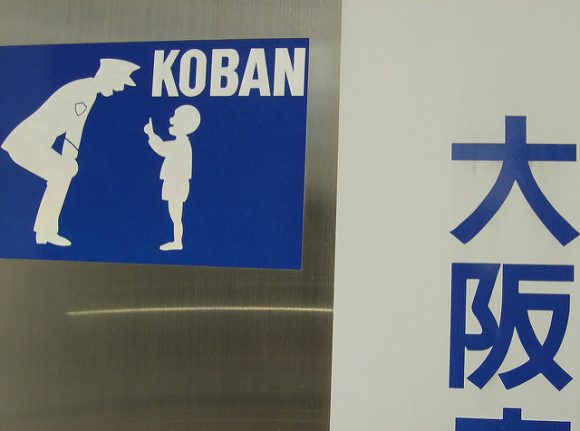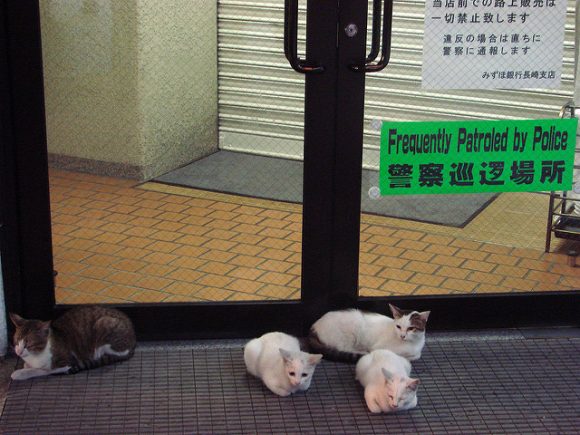
How likely are you to be stopped by the police in Japan?
Japan is not without its random, unpredictable crimes, but in general it’s one of the safest countries in the world. Rates of theft and violent crime are comparatively low, and with 24-hour-staffed “koban” police boxes every few blocks, it’s easy to feel protected here.
However, foreigners in Japan sometimes report being stopped by the police and asked for ID, a practice which can seem shocking and unfair, especially if you’re not sure why it’s happening. With the police in Japan having less violent crime to deal with, they’re often tasked with handling smaller matters like bicycle theft, lost items, and simply giving directions to passers-by. They also sometimes pop by your house on their rounds to leave a friendly note in your mailbox letting you know where your nearest koban is. In short, the police in Japan have quite an approachable image, and are often addressed by members of the public as “Omawari-san“, or, literally, “Mr./Ms. Walk-Around.”
So, why do they stop foreigners? Well, firstly it’s important to note that they also stop Japanese people and ask to see their IDs as well. Being stopped by the police in Japan doesn’t necessarily mean you’ve done anything wrong at all. If you’re an unfamiliar face in their patrol area, they may just want to know what you’re doing there.
When this writer was working in a small rural town in Kyoto prefecture, I was stopped in my first week there by a pair of officers who asked to see my ID (this was during the days of the Gaikokujin toroku/alien registration system, and not the residence system that’s in place today). I produced my ID, and then we had a really nice chat about the town and where all the best drinking spots were. They even told me about the town festival that was happening that weekend. Nothing to worry about, right?
Of course, the police sometimes stop people for more serious matters, including checking foreigners’ residence cards or passports to make sure they’re not illegally present in the country. Also, if a crime has been reported in the area, they may stop people randomly. If you’re riding a bicycle, they may stop you and ask to see your bike registration (since bike theft is a big issue in Japan, each bicycle must be registered at purchase.) If a police officer asks for your ID, you are legally obligated to show it. It is illegal to walk around in Japan as a foreigner without either your passport or residence card on your person. However, if you’re stopped by a plain-clothes policeman, it’s probably a good idea to ask to see their keisatsu techo (police badge) as well.
▼ More like purr-trolled by purr-lice :3
But how often do people get stopped by the police in Japan? YouTuber That Japanese Man Yuta conducted a survey of his viewers asking exactly that question. The results are quite reassuring! Yuta also describes his own personal experiences of being stopped by the police in the video, which you can watch below.
As Yuta’s initial survey shows, you’re only likely to be stopped by the police once every three years in Japan on average! Of course, it seems that some people get stopped far more often than others, though it’s not exactly clear what the main factor is. Yuta’s survey is ongoing so head over to this link if you’d like to share your personal experience!
Now we’re curious: If you’ve been to Japan, what do you think of the police in Japan as compared to the police in your home country?
Source: YouTube/That Japanese Man Yuta
Feature Image: Flickr/This Particular Greg



 Here’s a handy Japan cycling hack: pump up your tires for free at any police box
Here’s a handy Japan cycling hack: pump up your tires for free at any police box Japanese YouTuber joins calls to delete Logan Paul’s YouTube account 【Video】
Japanese YouTuber joins calls to delete Logan Paul’s YouTube account 【Video】 Westerners in Japan – do they really ALL speak English? 【Video】
Westerners in Japan – do they really ALL speak English? 【Video】 Please don’t make the stupid mistake of taking an “abandoned” bike for a ride in Japan
Please don’t make the stupid mistake of taking an “abandoned” bike for a ride in Japan Japanese people react to “But we’re speaking Japanese!” video, and it’s kind of stunning
Japanese people react to “But we’re speaking Japanese!” video, and it’s kind of stunning Yakuzen ramen restaurant in Tokyo is very different to a yakuza ramen restaurant
Yakuzen ramen restaurant in Tokyo is very different to a yakuza ramen restaurant Tokyo Skytree turns pink for the cherry blossom season
Tokyo Skytree turns pink for the cherry blossom season Starbucks Japan complexly raises prices, will now charge for takeout bags
Starbucks Japan complexly raises prices, will now charge for takeout bags What happens when you use a facial massage roller for two weeks straight?
What happens when you use a facial massage roller for two weeks straight? Here are the top ten foodie factory tours for the fall throughout Japan
Here are the top ten foodie factory tours for the fall throughout Japan Miss World Japan: The great-times-20-granddaughter of samurai lord One-Eyed Dragon
Miss World Japan: The great-times-20-granddaughter of samurai lord One-Eyed Dragon The 10 best day trips from downtown Tokyo【Survey】
The 10 best day trips from downtown Tokyo【Survey】 A look back on 40 years of Japanese schools banning stuff
A look back on 40 years of Japanese schools banning stuff Japan’s 10 best Ferris wheels for beautiful views, as chosen by travelers【Survey】
Japan’s 10 best Ferris wheels for beautiful views, as chosen by travelers【Survey】 Osaka establishes first designated smoking area in Dotonbori canal district to fight “overtourism”
Osaka establishes first designated smoking area in Dotonbori canal district to fight “overtourism” The 10 most annoying things foreign tourists do on Japanese trains, according to locals
The 10 most annoying things foreign tourists do on Japanese trains, according to locals Starbucks Japan releases new sakura goods and drinkware for cherry blossom season 2026
Starbucks Japan releases new sakura goods and drinkware for cherry blossom season 2026 Naruto and Converse team up for new line of shinobi sneakers[Photos]
Naruto and Converse team up for new line of shinobi sneakers[Photos] Is Sapporio’s Snow Festival awesome enough to be worth visiting even if you hate the snow? [Pics]
Is Sapporio’s Snow Festival awesome enough to be worth visiting even if you hate the snow? [Pics] Japan has trams that say “sorry” while they ride around town…but why?
Japan has trams that say “sorry” while they ride around town…but why? Sakura Totoro is here to get spring started early with adorable pouches and plushies
Sakura Totoro is here to get spring started early with adorable pouches and plushies Starbucks Japan unveils new sakura Frappuccino for cherry blossom season 2026
Starbucks Japan unveils new sakura Frappuccino for cherry blossom season 2026 Poop is in full bloom at the Unko Museums for cherry blossom season
Poop is in full bloom at the Unko Museums for cherry blossom season Now is the time to visit one of Tokyo’s best off-the-beaten-path plum blossom gardens
Now is the time to visit one of Tokyo’s best off-the-beaten-path plum blossom gardens Playing Switch 2 games with just one hand is possible thanks to Japanese peripheral maker
Playing Switch 2 games with just one hand is possible thanks to Japanese peripheral maker Japan’s newest Shinkansen has no seats…or passengers [Video]
Japan’s newest Shinkansen has no seats…or passengers [Video] Foreigners accounting for over 80 percent of off-course skiers needing rescue in Japan’s Hokkaido
Foreigners accounting for over 80 percent of off-course skiers needing rescue in Japan’s Hokkaido Super-salty pizza sends six kids to the hospital in Japan, linguistics blamed
Super-salty pizza sends six kids to the hospital in Japan, linguistics blamed Foreign tourists in Japan will get free Shinkansen tickets to promote regional tourism
Foreign tourists in Japan will get free Shinkansen tickets to promote regional tourism Take a trip to Japan’s Dododo Land, the most irritating place on Earth
Take a trip to Japan’s Dododo Land, the most irritating place on Earth Archfiend Hello Kitty appears as Sanrio launches new team-up with Yu-Gi-Oh【Pics】
Archfiend Hello Kitty appears as Sanrio launches new team-up with Yu-Gi-Oh【Pics】 Survey asks foreign tourists what bothered them in Japan, more than half gave same answer
Survey asks foreign tourists what bothered them in Japan, more than half gave same answer Japan’s human washing machines will go on sale to general public, demos to be held in Tokyo
Japan’s human washing machines will go on sale to general public, demos to be held in Tokyo Starbucks Japan releases new drinkware and goods for Valentine’s Day
Starbucks Japan releases new drinkware and goods for Valentine’s Day We deeply regret going into this tunnel on our walk in the mountains of Japan
We deeply regret going into this tunnel on our walk in the mountains of Japan Studio Ghibli releases Kodama forest spirits from Princess Mononoke to light up your home
Studio Ghibli releases Kodama forest spirits from Princess Mononoke to light up your home Major Japanese hotel chain says reservations via overseas booking sites may not be valid
Major Japanese hotel chain says reservations via overseas booking sites may not be valid Put sesame oil in your coffee? Japanese maker says it’s the best way to start your day【Taste test】
Put sesame oil in your coffee? Japanese maker says it’s the best way to start your day【Taste test】 No more using real katana for tourism activities, Japan’s National Police Agency says
No more using real katana for tourism activities, Japan’s National Police Agency says Westerners in Japan – Can they speak Japanese?【Video】
Westerners in Japan – Can they speak Japanese?【Video】 Osaka elementary school becomes first in Japan to have a police box established on campus
Osaka elementary school becomes first in Japan to have a police box established on campus British man arrested for biting Japanese police officer during shokumu shitsumon questioning
British man arrested for biting Japanese police officer during shokumu shitsumon questioning Japanese police car stolen by hooligans? Sapporo Halloween stunt baffles bystanders【Video】
Japanese police car stolen by hooligans? Sapporo Halloween stunt baffles bystanders【Video】 Minnesota riots prompt people in Japan to protest against racial profiling by police【Videos】
Minnesota riots prompt people in Japan to protest against racial profiling by police【Videos】 Now you can experience getting stopped by the Japanese police on Google Streetview
Now you can experience getting stopped by the Japanese police on Google Streetview Japanese people reveal their thoughts on Logan Paul’s disrespectful stunts in Japan【Video】
Japanese people reveal their thoughts on Logan Paul’s disrespectful stunts in Japan【Video】 Man with homemade firebomb detained by police outside U.S. embassy in Tokyo
Man with homemade firebomb detained by police outside U.S. embassy in Tokyo Why does Engrish happen in Japan?
Why does Engrish happen in Japan? How about some fake bird poo to protect your bike from thieves in Japan?
How about some fake bird poo to protect your bike from thieves in Japan? Mr. Sato asks the police how he can avoid getting hassled by them
Mr. Sato asks the police how he can avoid getting hassled by them Japanese man rides 1,000 kilometres on stolen mamachari bicycle to see Tokyo for first time
Japanese man rides 1,000 kilometres on stolen mamachari bicycle to see Tokyo for first time The time we got stopped by the cops trying to get ramen at a restaurant with a dirty-sounding name
The time we got stopped by the cops trying to get ramen at a restaurant with a dirty-sounding name How to protect your umbrella from rampant umbrella thieves in Japan
How to protect your umbrella from rampant umbrella thieves in Japan How to stop a chikan pervert from groping on a Japanese train
How to stop a chikan pervert from groping on a Japanese train